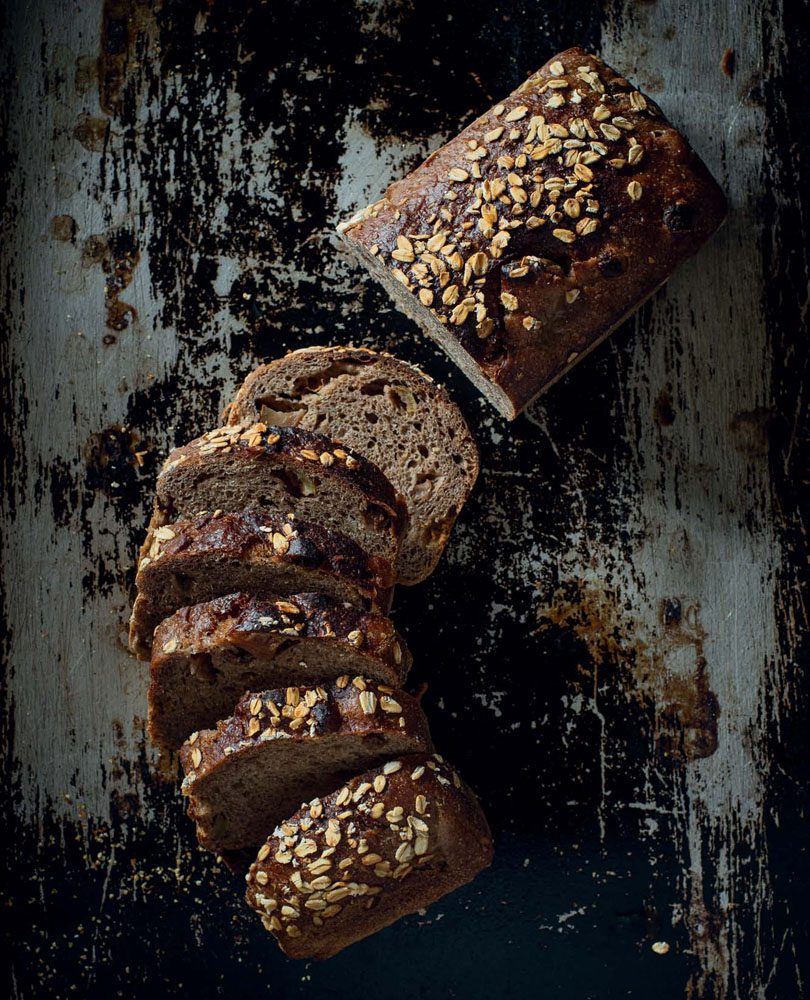ORGANIC RYE, ROASTED PEAR, OAT & SULTANA FRUIT BREAD
Jack O'Donnell

tags:rye, roasted pears, oat, sultana fruit, bread, pears, grapes
Makes
2 loaves of 1kg eachPreparation
1 - 1½ hrs over 2 days, plus proving time 3 - 4 hrs and overnight fermentingCook
1 hrIngredients
| 225g pears | |
| 550ml warm water | |
| 15g salt | |
| 500g organic white bread flour | |
| 200g organic rye flour | |
| 2 teaspoons ground cinnamon | |
| ¼ teaspoon nutmeg | |
| ¼ teaspoon ground allspice | |
| rolled oats, to sprinkle on top | |
| FOR THE LEVAIN | |
| 1 tablespoon sourdough starter (from your local artisan bakery) | |
| 100ml water | |
| 100g organic rye flour | |
| FOR THE SOAKER | |
| 100g raisins | |
| 80g rolled oats | |
| 160ml water |
Instructions
| 1. | Mix the levain and the soaker the day before, to allow good fermentation – this should take 12-16 hours at room temperature, but could be plus or minus 2 hours if it is warmer or cooler. |
| 2. | Mix all the levain ingredients in a bowl, cover with a breathable fabric cover or a lid with a small air hole and set aside overnight. |
| 3. | Follow the same method for the soaker, using a separate bowl. |
| 4. | Cut the pears into 2cm cubes and roast for 5-8 minutes at 180°C or until just softened but not starting to dry out. |
| 5. | The following day, check the levain – it should be airy and bubbly while still having some texture and structure. |
| 6. | Put the warm water into a large mixing bowl, add 200g of the rye levain, the salt and flours. |
| 7. | Mix until there are no dry clumps and scrape down the sides to incorporate until you have a shaggy dough. |
| 8. | Cover and rest for about half an hour. |
| 9. | Uncover the dough and add the soaker, roasted pears and spices, using your fingers to pierce the dough and evenly distribute the ingredients. |
| 10. | At this stage being rough with the dough is OK, as long as everything is well combined. |
| 11. | Wetting your hands, work carefully from each corner of the dough and fold it half way over on itself as if you were closing a book. |
| 12. | The dough should be smoother now and you should feel its resistance when you stretch it over itself. |
| 13. | Rest for half an hour. |
| 14. | Repeat this process for another hour, folding every half an hour; a total of three folds. |
| 15. | Grease two 1kg loaf tins. |
| 16. | Turn the dough out onto a floured surface and flour your hands and the top of the dough liberally. |
| 17. | Carefully divide the dough in half and, working with the full length of the dough facing you, tuck the ends in slightly. |
| 18. | Now with the end of the dough facing you, fold this one-third into the middle, then use both hands to roll the dough up and away from you while retaining some friction. |
| 19. | Seal the seam of the dough by pinching it along the line where the two edges have met. |
| 20. | Place the loaves seam-side down in the tins. |
| 21. | Spray the tops of the loaves with water and then sprinkle with rolled oats. |
| 22. | Cover and leave in a warm place for 1½ -2 hours or until at least doubled in size. |
| 23. | During this time heat the oven to 180°C. |
| 24. | Once the loaves are ready, place them in the oven; if you have a lid or flush-fitting tray place this on top for the first 30 minutes of baking, then remove and bake a further 20-30 minutes until the loaves are well coloured. |
| 25. | To get a nice crust on the bottom and sides you may want to remove them from their tins and return to the oven. |
| 26. | Let cool completely before slicing, a minimum of 6 hours though overnight is ideal. |
| 27. | Slices can be frozen in an airtight bag. |
Recipes Jack O’Donnell / Photography Amber-Jayne Bain

Leave a Reply